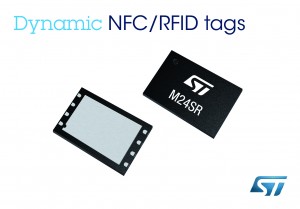New Delhi, November 21, 2013 – A vast range of consumer devices, domestic appliances and industrial equipment is set to become smarter, more flexible and easier to use because of a new family of “dynamic NFC tag” memories from STMicroelectronics (NYSE: STM), a global semiconductor leader serving customers across the spectrum of electronics applications. These memories make it easy to add Near Field Communications (NFC) capability to any kind of electrical device, from loudspeakers and printers, to cookers and washing machines, to electricity, gas and water meters.
NFC is a wireless communications technology that allows two devices to communicate when they are in close proximity, typically just a few inches from each other. Today, it is mostly recognized by consumers as a way to make contactless purchases with smartphones. Soon it will contribute to connecting objects to the “Internet of Things”, which will change the way consumers interact with those connected things. Although NFC capability is standard in many new smartphones and tablets, the time is coming for NFC connectivity in many other kinds of electrical or electronic devices.
ST aims to drive this change with its new M24SR family of “dynamic NFC tag” memories that allow any device, including printers, fitness watches, microwave ovens, smart electricity meters or digital cameras to feature built-in NFC connectivity, thereby allowing it to communicate with a smartphone that almost touches it.
“The key benefit of embedding NFC capability into almost any kind of equipment or device is that the device can then be designed to offer all the features that would be possible if they had keyboards, graphic displays and Internet connections, without actually having to incorporate these expensive and space-consuming features into the equipment itself; the user’s smartphone already has them and can ‘lend’ them,” says Benoit Rodrigues, General Manager, STMicroelectronics Memories Division.
One of the potential benefits enabled by the M24SR family is convenient Bluetooth pairing of a smartphone and an audio device. Instead of having to open the phone’s settings, turn Bluetooth on, select the audio device code name and sometimes enter a pass code, users can simply wave their smartphone by the NFC-enabled audio device, and automatically activate Bluetooth pairing between the two devices as settings have been transmitted over NFC.
Other examples include resetting the clock on any appliance after a power blackout or a change in daylight saving hours, or rapid diagnosis of faults in malfunctioning equipment. Instead of having to look for the instruction manual or call the manufacturer’s customer service, the user could simply run the “Reset my appliance clock” or “Diagnose Problem” app on their smartphone, touch the equipment with the smartphone, and the clock would be automatically reset or the problem remotely diagnosed through the connection to the manufacturer’s website.
“The M24SR family enables a new paradigm in how to interact with the world around us,” said Benoit Rodrigues. “Today, smartphones are increasingly at the center of how we interact with other people. Tomorrow, they will also be at the center of how we interact with everything we own or use.”
Technical Notes
ST’s “dynamic NFC / RFID tag memories” are silicon chips that contain three key blocks:
(1) a non-volatile memory (NVM), which is an electronic memory that retains its stored data even when its power supply is switched off;
(2) a wireless interface for communicating with other wireless devices;
(3) a wired interface (industry-standard I2C) for communicating with the controller of the host equipment.
In the M24SR family, the NVM is implemented as EEPROM (Electrically Erasable Programmable Read-Only Memory) in sizes ranging from 2 to 64Kbit, covering all current market demands. ST is the world leader in EEPROM technology and the world’s largest supplier of EEPROM memories.
The wireless interface is fully compatible with the ISO14443-A protocol that enables data rates up to 106kb/s, while the I2C interface operates at speeds up to 1MHz, ensuring fast data transfer between the smartphone and the target equipment.
The EEPROM memory bank is preformatted for NFC operation, supporting the NFC Data Exchange Format (NDEF), and uses the latest and most reliable EEPROM technology, with data retention guaranteed for 200 years, one million write-erase cycles, and 128-bit password protection for maximum security.
Offered in compact and cost-effective SO8, TSSOP8 and MLP8 packages, the M24SR devices are now available in samples for OEM customers.



